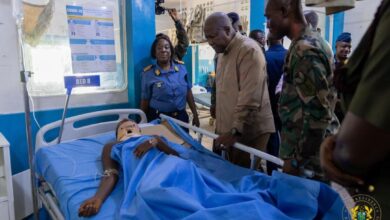It is time for Ghana to invest in aeroponics; A practical path to food security and youth employment


Ghana stands at a pivotal moment in the evolution of its agricultural sector. With the rollout of the Feed Ghana Programme (FGP) under the broader Agriculture for Economic Transformation Agenda (AETA), the country has reaffirmed its commitment to modernising food production, improving self-sufficiency, and creating sustainable livelihoods for young people and women.
This ambition is timely. Yet, to succeed, policy must be matched with the right technologies; technologies that thrive amid climate variability, rapid urbanisation, and rising consumer demand for safe, fresh food.
One promising solution that deserves urgent national attention is aeroponics – an advanced cultivation method where crops grow without soil, with roots suspended in air and misted with a nutrient-rich solution. Though the term may sound futuristic, its promise is practical: more food grown using less land, far less water, and minimal pesticide use, all in controlled environments close to where people live.
As cities expand and arable land becomes increasingly limited, aeroponics offers Ghana a path to produce more vegetables and herbs locally, reduce reliance on imports, and strengthen food security year-round. This is not a replacement for traditional farming but a strategic complement that fits naturally within Ghana’s agricultural modernisation agenda.
Why Aeroponics matters now
Across Accra, Kumasi, Takoradi, and Tamale, demand for fresh vegetables is growing rapidly. Hotels, schools, hospitals, supermarkets, and the hospitality industry require reliable produce that is clean, consistent, and safe. Yet seasonal fluctuations, climate pressures, and logistical bottlenecks often disrupt supply and inflate prices.
Aeroponic systems can help stabilise this market by offering:
- Up to 90% less water usage compared to open-field farming; a critical advantage in the face of erratic rainfall and irrigation challenges.
- Year-round production, unaffected by droughts or floods.
- Reduced land requirements, allowing fresh produce to be grown near urban centres, minimising transport losses.
- Minimal pesticide use, improving food safety and public health outcomes.
Global examples, from Singapore and the United States to Kenya and Rwanda, demonstrate that aeroponics can be commercially viable when implemented at scale and connected to reliable markets. Ghana can adapt these lessons rather than reinventing the wheel.
Aligning with Ghana’s National Agricultural Strategy
The Feed Ghana Programme seeks to increase productivity, modernise farming practices, expand youth participation, reduce imports, and enhance national nutrition. Aeroponics directly supports each of these objectives. It also opens new employment pathways for young people, from system operators and agronomists to digital technicians, nutrient-blending specialists, greenhouse managers, and logistics coordinators.
Instead of being told to “go to the farm,” young people can now build agribusinesses in their own communities, including urban and peri-urban areas. This is how agriculture becomes modern, tech-driven, and financially rewarding.
Acknowledging the challenges
To adopt aeroponics successfully, Ghana must plan carefully around real constraints:
- High upfront costs compared to traditional farming.
- Stable power supply is crucial for maintaining systems, though solar-hybrid options are increasingly viable.
- Skills and training are essential – operators must be equipped to manage controlled environments.
- Market linkages must be secured to guarantee consistent buyers and stable pricing.
These are not barriers but design considerations. The best approach is to begin with well-structured pilot projects, supported by government, financial institutions, and development partners; then scale gradually using data to prove commercial and social viability.
A practical roadmap for government and stakeholders
Launch government-supported pilot demonstration farms:- Establish about 10 aeroponic demonstration sites in Accra, Kumasi, Takoradi, Tamale, and one coastal agro-ecological zone. Each should be linked to institutional buyers such as the school feeding programmes, hospitals, supermarkets, and hospitality suppliers, to ensure stable revenues and generate real-world data.
Develop blended financing options: Government, development partners, and banks can collaborate to provide partial grants, medium-term leasing options, and working capital loans tied to purchase contracts. This blended financing model will reduce the cost burden on agripreneurs.
Build local capacity: Universities, polytechnics, and agricultural colleges should introduce certification programmes in controlled-environment agriculture, ensuring a skilled workforce capable of operating and managing systems efficiently.
Establish clear food safety and quality standards: The Ministry of Food and Agriculture (MoFA) and the Food and Drugs Authority (FDA) should set standards and regulatory clarity to enhance consumer confidence in aeroponically grown produce.
The role of banks
Financial institutions must rethink how they finance modern agriculture. For aeroponics, this could include:
- Leasing models for equipment instead of full upfront purchases.
- Short tenure working capital loans tied to quick harvest cycles.
- ESG-aligned financing structures that support water-efficient, low-input farming.
With structured financing and reliable market linkages, aeroponics can scale sustainably and profitably.
Aeroponics represents a strategic opportunity for Ghana to advance food security, youth employment, and climate resilience. It does not replace staples like maize, cassava, cocoa, or rice; but it can transform our vegetable supply chain, reduce import dependence, and build resilience in an era of climate uncertainty.
The time to modernise is now. With clear policy direction, blended financing, and skills development, Ghana can emerge as a continental leader in climate-smart food production.
As we look to the future, our goal should be simple: to feed ourselves well, responsibly, sustainably, and with systems built for the future, not the past.
*****
Queenly Joy Smith, VP, Agriculture & Soft Commodities, Corporate and Investment Banking, Stanbic Bank Ghana.
DISCLAIMER: The Views, Comments, Opinions, Contributions and Statements made by Readers and Contributors on this platform do not necessarily represent the views or policy of Multimedia Group Limited.
DISCLAIMER: The Views, Comments, Opinions, Contributions and Statements made by Readers and Contributors on this platform do not necessarily represent the views or policy of Multimedia Group Limited.
Source link





